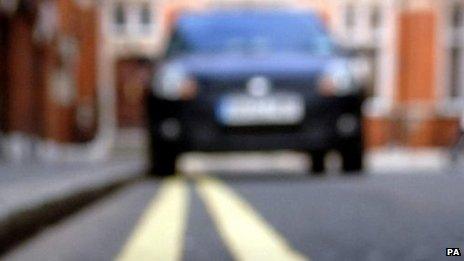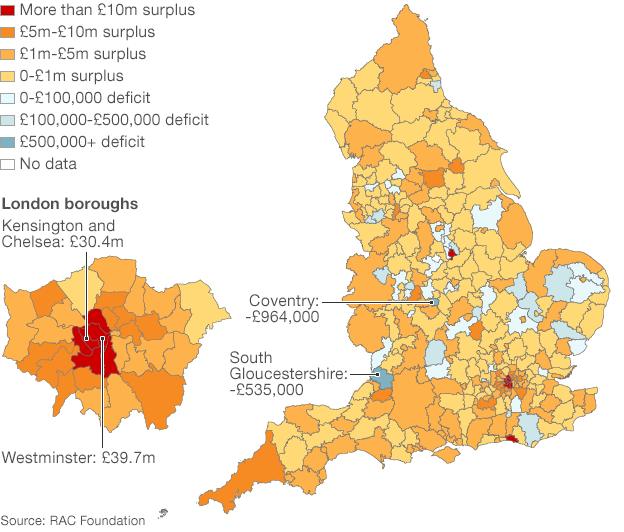Parking offence fines in England could be cut
- Published
- comments

Parking fines in England could be reduced, amid claims some councils are using them as a "cash cow".
The government could also order local authorities to bring in a five-minute "grace period" before issuing tickets when cars remain in bays for too long.
And it is looking at banning the use of CCTV cameras to enforce on-street parking restrictions.
Fixed-penalty charges currently range from £70 to £130 in London and from £40 to £70 elsewhere.
In a recent report, the Commons Transport Committee said it was "hard to justify parking fines that are substantially more than the fines for more serious offences like speeding", for which the minimum penalty is £100 and three penalty points added to the offender's licence.
'Initial step'
Since then, Transport Secretary Patrick McLoughlin has frozen the maximum fines councils can impose for parking offences until the 2015 general election.
But, in its response to the MPs' report, the Department for Transport goes further in looking at changing the system, saying it is "considering the legislative options to abolish the minimum rates for parking penalty charges".
This would be "an initial step to giving local authorities the scope to allow lower charges (than £70 in London and £40 in the rest of England) for minor parking variations", such as overstaying in car parks or on-street bays.
It is also looking at banning the use of CCTV cameras to enforce on-street parking restrictions, after the MPs said this could make "common-sense" decisions on when to issue penalties more difficult.
The Local Government Association has calculated that councils made a surplus from on- and off-street parking of £411m in 2011-12, while the RAC Foundation put the figure at £565m.
It is illegal for local authorities to set fines in order to raise revenue.
'Positive'
In a report published last autumn, external, the Transport Committee said: "A common-sense approach to parking enforcement should minimise the issuing of penalty charge notices to motorists who make honest mistakes."
This should include imposing a nationwide five-minute "grace" period before imposing fines on drivers whose parking tickets have expired, as already happens in some areas, it added.
In its response, the government says this is "worthy of consideration" and is asking the public to put forward its views on this and other proposals.
Transport minister Robert Goodwill said: "The government is committed to reining in over-zealous parking enforcement and unjust parking practices. It is not fair to motorists and needs to stop. That is why we have frozen parking penalty charges for the remainder of this parliament. However, we haven't stopped there.
"We have also recently launched a public consultation proposing a number of changes to make sure local authorities are not short-changing motorists and operate in a fair manner. These changes could see the end of CCTV being used for on-street parking, unnecessary yellow lines and the introduction of compulsory 'grace periods' at the end of paid on-street parking."
The Transport Committee's chairman, Labour MP Louise Ellman, said: "Parking enforcement is an important issue for motorists and for the management of urban roads - including the revitalisation of our town centres so the Transport Committee is pleased to see the government take such a positive attitude to our recommendations."
Prof Stephen Glaister, director of the RAC Foundation, said: "We should see most parking offences for what they are. Not crimes but misdemeanours and we need enforcement that reflects this.
"We need some proportionality and transparency. At the very least all councils should publish an annual report outlining what their parking policy is, how charges are set and where any surplus goes."
Local authority parking operations, 2012-2013

- Published23 December 2013
- Published23 October 2013
- Published2 August 2013